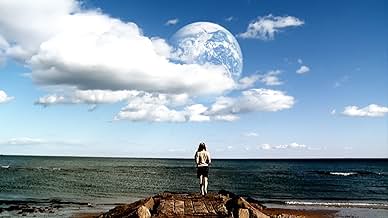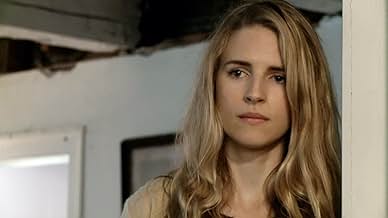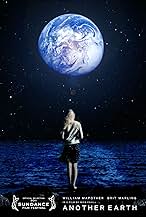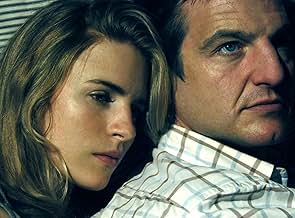In der Nacht, als die Existenz einer zweiten Erde im Sonnensystem entdeckt wird, kreuzen sich bei einem tragischen Unfall die Wege einer ehrgeizigen jungen Studentin und eines bekannten Komp... Alles lesenIn der Nacht, als die Existenz einer zweiten Erde im Sonnensystem entdeckt wird, kreuzen sich bei einem tragischen Unfall die Wege einer ehrgeizigen jungen Studentin und eines bekannten Komponisten.In der Nacht, als die Existenz einer zweiten Erde im Sonnensystem entdeckt wird, kreuzen sich bei einem tragischen Unfall die Wege einer ehrgeizigen jungen Studentin und eines bekannten Komponisten.
- Regie
- Drehbuch
- Hauptbesetzung
- Auszeichnungen
- 7 Gewinne & 14 Nominierungen insgesamt
- Symposium Speaker
- (as Joseph Bove)
- Dr. Richard Berendzen
- (as Dr. Richard Berendzen)
Empfohlene Bewertungen
The movie is not about anything as terrestrial as gravity. In the world of this movie, something has happened to upset some kind of cosmic symmetry, and the other earth has appeared from a parallel universe. I do wish some character or other had dispelled the physics with "I don't know why our orbits are not affected". But, the metaphor works as a way to discuss looking at oneself. It really does not matter. The acting is perfect, the camera-work perfectly beautiful, the plot deeply affecting with wonderful surprises.
17 year old Rhoda Williams (Brit Marling) has just been accepted into MIT (Massachusetts Institute of Technology). Her celebration is short-lived when after a night of partying, crashes her car into a vehicle driven by John Burroughs' (William Mapother), instantly killing his wife and son. Although Rhoda appears to be intoxicated, her distraction comes from a radio broadcast stating the discovery of a planet that closely resembles Earth. Four years later, Rhoda is released from prison; her spirit broken and dreams shattered, she takes up a janitor's position at a local school. At this point, there are various theories about the other planet. When contact is made, it is established that the other planet is in fact a mirror Earth having entered our solar system from a parallel dimension. Preparations are made to travel to the other Earth and Rhoda participates in a competition to become one of the first civilians to accompany astronauts to the approaching mirror Earth. After cleaning the school for some time, Rhoda approaches John with the intention of apologizing for her carelessness, but loses her nerve and poses as a maid-to-order cleaner. A music professor at Yale, John has become an alcoholic with disregard for his profession ever since the accident. He buys into Rhoda's pretence and has her clean his house once a week. In time, she helps him overcome his grief but never discloses who she really is. Just when they seem to be drawn to each other, Rhoda wins the competition to travel to the other Earth. She must now decide between confronting her demons and telling John the truth or escape her past and start a new life on the other Earth.
Until this point, the story unfolds remarkably in an easy to watch, evenly paced narrative. As a viewer, I was captivated right from the start. Co-written by Marling and director Mike Cahill, the screenplay has impeccable character detail relating to ample areas that allow us to probe within our own faults and limitations. As the lead character, Rhoda Williams is a bright individual with an even brighter future who throws it all away with just one stupid mistake. How many of us can look within ourselves and honestly claim that we have never made a mistake worth regretting? If you can raise a hand to that question then you must be a renowned hero, or one very self-righteous individual. Cahill's biggest accomplishment is in Rhoda's character study— An intelligent and ambitious teenager reduced to a confused and troubled adult, but a wiser one having learnt from her mistake. In giving life to this character, Marling is flawless and ironically powerful as a helpless woman fallen from grace. After this movie, I can only expect that we are about to see a lot more of Marling in the years to come. William Mapother as John is almost as inspiring as a man who has lost everything but the heart to recovery. With nothing to lose, it is always easy to give up on life, but Mapother does an exceptional turn around with John and gives closure to his character. Kumar Pallana has very few scenes in this movie but plays a vital role in mentoring Rhoda into redemption. He does this without much dialogue but with uncanny screen charisma.
As a debut directorial, Cahill also gets top credit for the picture post-card cinematography. Beautiful would be an understatement. We have cinematography dependent films with similar themes in GATTACA and SOLARIS, but nothing compares to the way Cahill renders his landscape in this movie. Also noteworthy is the pulsating score, used sparingly but effectively. Additionally, there is a scene on how to make music using a tool that is usually annoying to the ear. Amazing! For a shoe-string budget, this film did not win two awards at the 2011 Sundance Film Festival by pot-luck. That alone should silence haters for questioning the film's scientific logic or lack of. This is not about conquering another planet (done to death!) or alien invasions. It is about redemption through self-discovery and re-invention of one's self esteem by learning from the past and learning to let go of the past. It is about looking at a mirror image of one's self as opposed to assuming everything is perfect. For a drama, this film is as beautiful as it is poetic. Just don't expect any eye-popping special effects. There are tons of other movies catering to that need.
It's important I explain this for two reasons: first because I saw this movie "tabula rasa", having not seen trailers, read reviews or having any idea what it was about. Secondly it became evident from the bad- tempered muttering in the back I wasn't the only one to have done this.
At first I struggled with the concept, but I kept an open mind and a very different movie to the one I thought I would see developed, and was actually quite well done. After about 20 minutes I was ready to get up and leave, but giving it time paid back dividends, by the last half-hour I had become too involved to consider leaving.
The story is a slow burner that grips you incrementally, and while the occasionally grainy or out of focus shots give you the strong impression this was made on a shoestring, that is no reason to hold anything against it. Having seen the high budget yawn-fest "Transformers" I can actually say that given the current state of big budget science fiction this is a refreshing, if a bit left-field approach to the genre.
Evidently my companion viewers in the cinema, a small group of guys, were not getting as much out of the deeply troubled love story that forms the basis of the plot, and they made their discontent very audible to my irritation.
In brief, not a film for everyone, but if you're in the mood for an introspective slow-burner and you've got the patience for it, this film will prove a rewarding experience
Unfortunately, this whole concept just sort of meanders around in the back ground.. literally, shots of 'another earth' in the sky, becoming more of a by-product.
This film, essentially a dramatic piece focusing on the aftermath of a tragedy, is actually good. Sadly, it just isn't what I came for and I felt slightly cheated at the lack of any actual sci-fi alien planet doppelgänger earth action. I'm aware of the concept, and it works as a metaphor - but it felt like the film was pulling in two different directions, marketing as one thing but delivering another.
17 year old Rhoda Williams (Marling, engaging in double duty as writer and star), who is fascinated by astronomy, has just been accepted into MIT and has been celebrating at a party with friends. On her way home, drunk and distracted by the news on the radio of a second, Earth like planet that has appeared in the sky, causes an auto accident. In the second car is music professor John Burroughs (William Mapother), his pregnant wife and young son. Both the son and wife are killed in the accident, Burroughs ends up in a coma, and Rhoda spends the next four years in prison. After being released, she asks to be placed in a job that keeps her interaction with people to a minimum, and so ends up as a janitor at a local high school. Wracked with guilt at her part in the accident, she decides to visit Burroughs, who has turned to alcohol in the intervening years since awakening from his coma, but cannot bring herself to reveal the truth to him, and ends up pretending to be from a cleaning service and thus begins helping him put his home, and to some extent, his life back together.
In the time since the evening of the accident, the new planet has drawn closer to our Earth, and it is revealed to be an almost exact duplicate of Earth, with the same continents, and, as revealed on a news broadcast where radio transmission to the planet is attempted, possibly the exact same people. Rhoda, desperate to take hold of all that was lost from her participation in the accident, writes an essay to attempt to join the crew of the first planned expedition to the second Earth, while at the same time, her relationship with Burroughs, who does not know who she is, begins to grow.
Another Earth focuses its attention on Rhoda, who, in a moment of stupidity and selfishness, caused the irrevocable destruction of John Burroughs world as he knew it, and has been consumed by the results of her actions. Another Earth approaches her in a more realistic manner than many other dramas have, showing how that unfortunate mistake has transformed her world. Another Earth delves into her situation, affected by her guilt in her participation in the terrible tragedy and potentially unable to move on with her life. Another Earth delivers much of this often without long bouts of dialogue, relying largely on Marling's performance to deliver the emotional core of this character, and she proves up to the task. Marling unveils Rhoda to us through body language and sobering looks, and we can feel how so much of her was transformed that night. Another Earth doesn't specifically make us feel sorry for her, she accepts her responsibility in the tragedy, but it also does paint a picture of a human who, do to how society treats those who commit acts like this, even if accidental, seems to have fewer options available.
Burroughs, while not ignored, lacks the same degree of development, and we largely view him through Rhoda's gaze. He has crawled inside a bottle to salve his wounds and stayed there. When Rhoda enters his house, she seems to be the first significant human contact Burroughs has had in some time, and he opens up the closed gates of his world to her, first a little, but gradually much more. We can feel his pain and understand his helplessness as he continues on after so much has been taken from him, but he doesn't quite reach the same level of depth as Rhoda, however he is hardly a cipher.
If Another Earth missteps, it comes late in the film, where certain decisions are made that are arguably too manufactured, too melodramatic for this film that seems mostly interested in not working in the standard trumped up events of similar material, and while it certainly doesn't ruin Another Earth, it does seem a bit overdone, where a subtler, more realistic choice might have been better.
Against the story of these two characters, the revelation of the second Earth plays as a backdrop, but at key moments this plot thread delivers interesting material that allows Another Earth to move beyond the standard for a drama of this type. The idea of how this second Earth is similar, but also different, from our own is touched upon, but then becomes a greater piece of the narrative, allowing it to move in somewhat unique directions. Another Earth uses the science fiction conceit of the second Earth as a catalyst for story and character development, not as thin excuse to throw a bunch of special effects on the screen.
Another Earth is a small, somewhat slow piece that deals less in the fantastical nature of it's title and subplot, but more in the isolated world of two people who were changed by one terrible event. With Marling's strong performance and the film's focus on the characters and their coping with a horrible event, Another Earth proves to have it's aim set on a more precise and personal target than you might think.
WUSSTEST DU SCHON:
- WissenswertesBrit Marling wanted William Mapother because she had been haunted by his performance in In the Bedroom (2001). Mapother agreed to make the film for $100 a day.
- PatzerIf a planet the size and density of Earth appeared so close to itself, the gravitational pull would cause significant changes in its orbit and 'Earth One' would suffer from constant disasters, e.g. floods, earthquakes, thunderstorms.
- Zitate
Rhoda Williams: You know that story of the Russian cosmonaut? So, the cosmonaut, He's the first man ever to go into space. Right? The Russians beat the Americans. So he goes up in this big spaceship, but the only habitable part of it's very small. So the cosmonaut's in there, and he's got this portal window, and he's looking out of it, and he sees the curvature of the Earth for the first time. I mean, the first man to ever look at the planet he's from. And he's lost in that moment. And all of a sudden this strange ticking... Begins coming out of the dashboard. Rips out the control panel, right? Takes out his tools. Trying to find the sound, trying to stop the sound. But he can't find it. He can't stop it. It keeps going. Few hours into this, begins to feel like torture. A few days go by with this sound, and he knows that this small sound... will break him. He'll lose his mind. What's he gonna do? He's up in space, alone, in a space closet. He's got 25 days left to go... with this sound. So the cosmonaut decides... the only way to save his sanity... is to fall in love with this sound. So he closes his eyes... and he goes into his imagination, and then he opens them. He doesn't hear ticking anymore. He hears music. And he spends the sailing through space in total bliss... and peace.
- VerbindungenFeatured in Ebert Presents: At the Movies: Folge #2.1 (2011)
- SoundtracksAnother Earth
Performed by Natalia Paruz (as Natalia 'Saw Lady' Paruze)
Written by Scott Munson
Published by Ameriklectic Music
Top-Auswahl
Details
- Erscheinungsdatum
- Herkunftsland
- Offizieller Standort
- Sprache
- Auch bekannt als
- Một Trái Đất Khác
- Drehorte
- West Haven, Connecticut, USA(waterfront)
- Produktionsfirma
- Weitere beteiligte Unternehmen bei IMDbPro anzeigen
Box Office
- Budget
- 100.000 $ (geschätzt)
- Bruttoertrag in den USA und Kanada
- 1.321.194 $
- Eröffnungswochenende in den USA und in Kanada
- 77.740 $
- 24. Juli 2011
- Weltweiter Bruttoertrag
- 1.938.783 $
- Laufzeit1 Stunde 32 Minuten
- Farbe
- Sound-Mix
- Seitenverhältnis
- 1.85 : 1
Zu dieser Seite beitragen






































